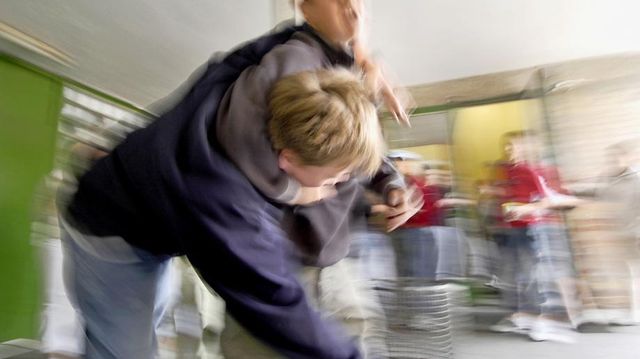
News -
A foundation wants to launch a tool at school that allows students to report violence and receive support.
Nearly 6% of Geneva's secondary school students report being harassed at school or on social networks, according to a study by the Department of Education.
The school, a place of learning and socialization. But theater, too, of violence. Nearly 6% of Geneva's secondary school students report being harassed at school or on social networks, according to a study by the Department of Public Education (DIP). And this is without counting the cases of discrimination, exclusion, racketeering. School violence widespread but often invisible, stifled by fear or shame. The mobile application SpeakUp wants to break this silence by allowing victims to take the step of denunciation.
The Non-Violence Project (NVPF), recognized as a public utility, has tested this system among 130,000 students worldwide and aims to spread the application in Geneva schools by the start of the school year.
This Swiss organization, set up in 1993 to help stop violence through education, has twelve offices in the world and has just set up its headquarters in Geneva. He has developed several educational programs, including on the behavior to be adopted in the face of violence. "With SpeakUp, we wanted to go further," says Blaise Oberson, General Manager of the foundation. Most victims are silent because they fear retaliation, reactions from their peers or simply have no one to talk to. SpeakUp gives them a voice and an attentive ear.
A voice and an ear
This application, developed by Americans, makes it possible to report incidents suffered by the student or witnessed, anonymously or not. He simply selects the type of incident (hazing, harassment, drug, among other proposals) and the place and then describe in a few words the problem. The report lands in a mailbox, relieved by masters appointed to the task. It is up to them to acknowledge, to initiate the dialogue, to propose a discussion or even an interview. "They work with other professionals (school nurse, educator), are trained for a day and can turn to our helpdesk if needed."
Abuses are marginal
SpeakUp is linked to a platform developed by the foundation, which offers the school targeted educational actions depending on the problems encountered by the application. Because it provides statistics on the types, frequencies and places of violence. "It gives managers an overview of what's going on in their institution."
In two years, the application and platform have been tested in schools in Sweden and the United States. "It has proven itself and detected many cases - 80% related to harassment - which most often resulted in meetings with professionals."
With this system, is there not a risk of encouraging delation, even defamation?
"Young people take it all seriously. There are abuses, but they are marginal. "He adds:" You have to know what is meant by denunciation. Reporting is positive if it improves a situation! It is actually a testimony. Experiments have shown that students do not play cops or accuse them. They are empowered and realize that a report, even anonymous, is not insignificant, it is a written record. And most importantly, they understand the value of the project. "
200 schools have already signed
The foundation now wants to officially launch its program. "Almost 200 schools in the world have already signed. We are going to contact the DIP, which could be a complement to his anti-harassment plan. "However, there are two pitfalls: the program has a cost of CHF 3.- per student. "This money does not come back to us, but pays for those who created the application and are responsible for maintenance, among others," says Blaise Oberson. We count on donations to support our projects.”
Another possible point of tension is to find volunteer masters ... "I do not think we will have any difficulty in finding them," replied Blaise Oberson. It's a project that benefits the entire school. "
Since the DIP has not yet been contacted by the foundation, it indicates that it has not decided on this project. On the part of organizations concerned by the problem, the initiative is welcomed. "Everything that can help a young person to communicate is positive," says Bernhard Bürki, spokesperson for Pro Juventute. But it is essential that the people who listen to them can offer support and answers in a professional manner, "he said, recalling the existence of the youth emergency number, 147.
Par Amélie Toninato (« Tribune de Genève », October 13, 2017)